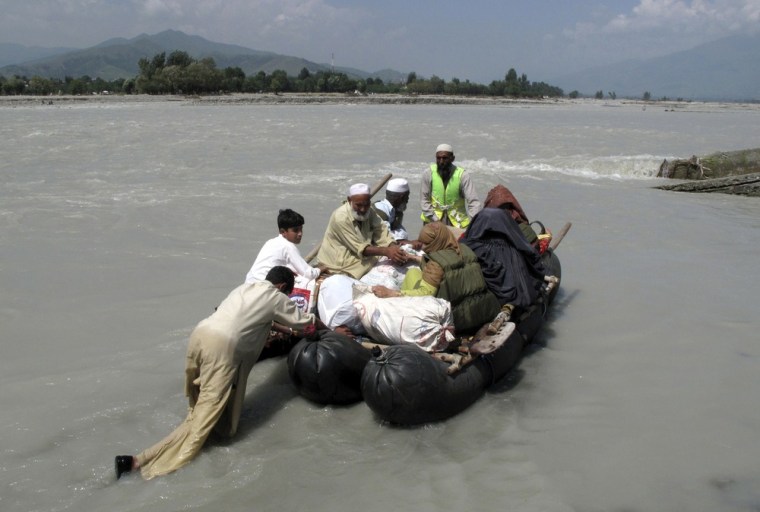Fisherman Jamsheed Ali made about 200 rupees ($2) a day before floods ravaged Pakistan and left millions homeless and penniless.
Now one of the biggest catastrophes in Pakistan's history has given him, and a growing number of others, the chance to become an entrepreneur of desperation.
The Swat River, which offered a fish or two a day before the crisis, is now the source of big profits every time he charges people to transport them across it in his raft made of rubber tubes, rope and bamboo.
He takes home the equivalent of $35 a day transporting people, and there is also another source of income. Some families pay him a gratuity if he helps them find the body of a loved one who drowned in the flooding.
"I am doing this because I like to help people and for the blessing of the almighty Allah. I am also making money out of it," he said.
The people in Swat have long craved stability. Two years ago Taliban militants took over the picturesque valley.
Fighting between militants and the government destroyed parts of the former tourist hub when the army pushed the Taliban out last year.
Now the floods have brought unprecedented sorrow and will inflict long-term economic pain on the Pakistani government, which will need to divert funds away from development projects to the relief effort.
On Saturday, new flooding in the south forced 150,000 more people to join the 600,000 already in relief camps.
Economic growth is not a worry for the flood pioneers, who range from the likes of Ali to industrialists making plastic tents.
More than 4 million Pakistanis are still homeless and 18 million have been affected by the calamity. The U.N. has issued an appeal for $459 million, of which about 60 percent had been pledged.
So there are plenty of people looking for help that aid groups, the military and the government have not been able to provide. Even if it comes at a price.
Chmni Khan, a skinny tall man wearing a traditional Pakistani tunic, used to be a mechanic.
After the floods he started a business ferrying stranded people across the Swat River, earning what he used to in a week in just one day. He says he is not exploiting misery. But he doesn't turn down money.
"I don't force people to pay. It's a service to the needy," he said.
Syed Sakhawat Ali, in the Muzaffargarh district of Punjab, is profiting from those forced to sell livestock they managed to salvage from the floods to survive the disaster.
He buys animals at almost one-third their original price and sells them in the market.
"People need money and they are selling their animals. We are not forcing them to do so," said Sakhawat Ali. Even though his house was flooded, he had enough cash in hand to start a lucrative trade.
"In a sense, I am doing a favor for them. These animals would have died from starvation anyway," he said.
The floods began in late July in the northwest of the country after exceptionally heavy monsoon rains, expanding rivers that have since swamped eastern Punjab province and Sindh province in the south.
A slew of aid groups have been trying to help the government in its relief effort by providing food, medicine, shelter and other crucial assistance. Poor weather and the destruction of roads and bridges have hindered the distribution.
The United Nations said it needs at least 40 more helicopters to reach the large number of people cut off by the flooding.
"We need more of these lifesavers," said the World Food Program's Pakistan country director, Wolfgang Herbinger.
